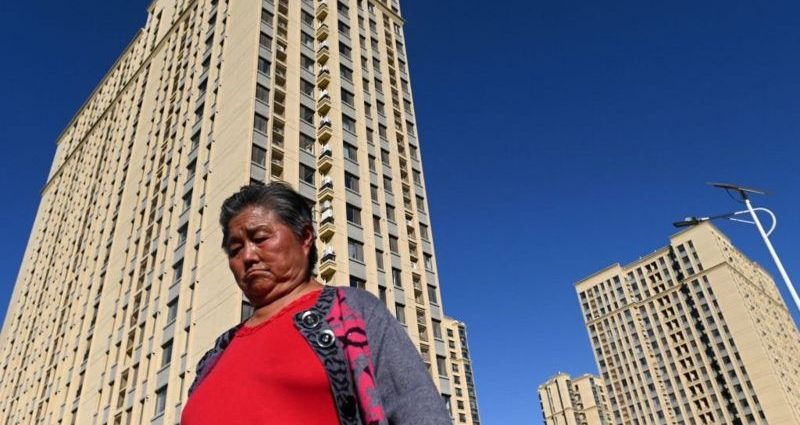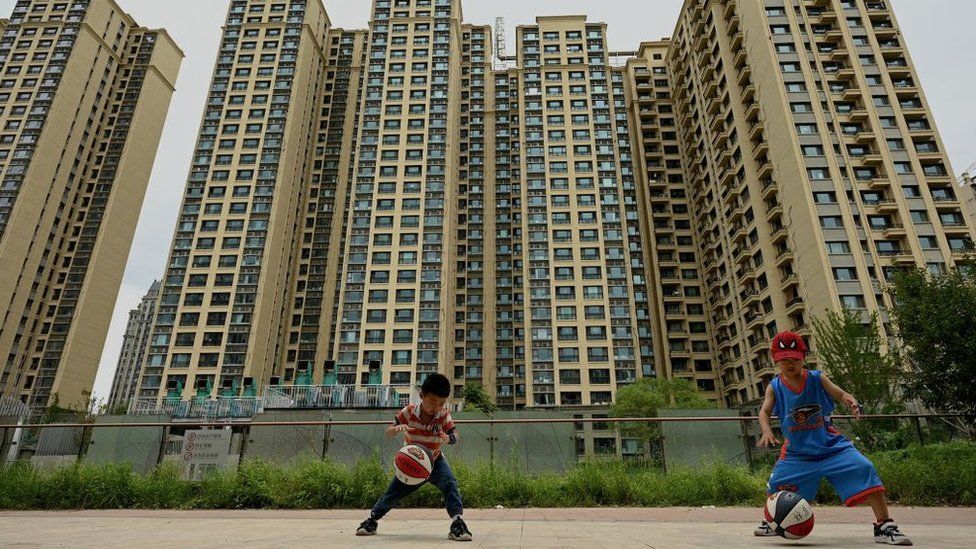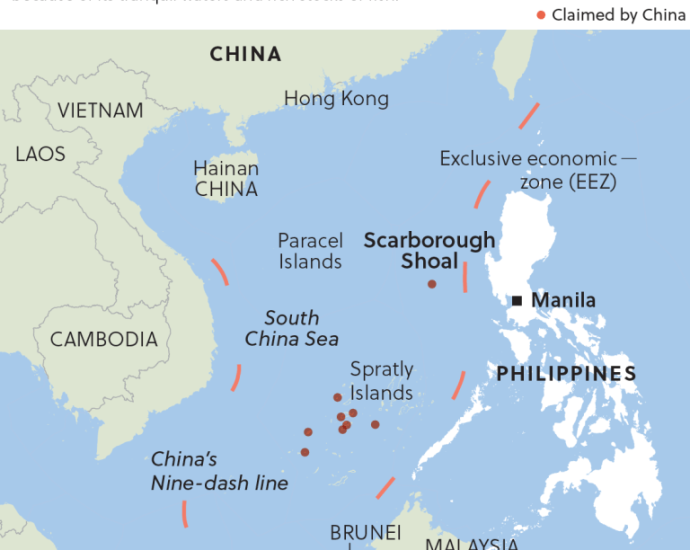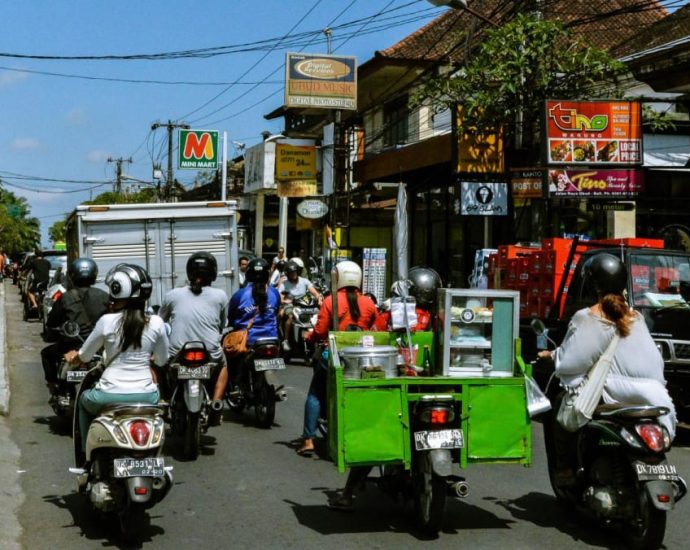Evergrande: Anxious Chinese home buyers reel from crisis
 Getty Images
Getty Images“When I think about it, I cry,” says Mrs Guo about the home she had bought. “It’s hard, and I feel sorry for my son and myself.”
In 2021, just months before the Chinese property giant Evergrande showed the first signs of crisis, Guo Tianran (whose name has been changed on request) and her husband bought an apartment off-plan for their only child from the top-selling developer.
The couple, nearing their 60s, had scrimped to afford the $30,000 (£24,500) down payment on the yet-to-be-built flat. They bit the bullet in pledging to use 75% of their income to pay for the mortgage.
“We wanted to help our son, to give him a place to start out on once he graduates from college,” Mrs Guo told the BBC earlier this month. But just months after their purchase, Evergrande’s facade began to crack.
In Henan, the central Chinese province where they had bought the home, building work ground to a halt.
“We saw the main frame being built, and suddenly we heard that Evergrande was falling. Then construction stopped last year,” she says.
In September 2021, Evergrande failed to repay more than $100 million to offshore lenders. At that time it was estimated that the firm had more than 1.5 million unfinished homes. The default brought to light a real estate crisis in China which is still spiralling two years later. The bankrupt firm has spent the past 18 months trying for a recovery deal, but news this week that its founder Hui Ka Yan and other senior leaders have been detained by police has renewed alarm over its future.
“I used some of my retirement money for the down payment. We will be paying [off the] mortgage for the next 30 years,” says Mrs Guo who was initially told that she would get the keys by December this year.
But as China’s housing crisis grows, so have her fears: “We don’t want to end up with nothing,” she said.
It’s a worry shared by so many others who have sunk their life savings into a new home – that their dreams have been bulldozed.
What is adding to the worry is that Evergrande is not the only real estate developer in deep trouble. Another property giant, Country Garden, reported a record $6.7bn half-year loss. Analysts estimate it has sold one million homes that are yet to be completed.
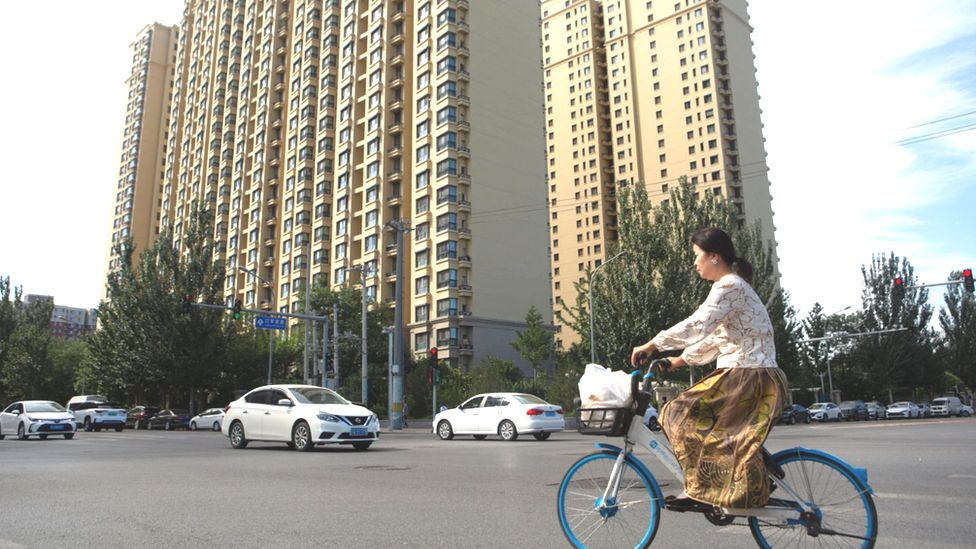
“I almost bought an apartment from Country Garden,” said 31-year-old Zhang Min who also lives in Henan.
She told the BBC that she and her fiancée had planned to buy the place as their marital home. Her parents’ house had been built by Country Garden, and the young couple had been told they could buy a discounted property in August. But they changed their mind when they heard the firm was on the brink of a default.
“We’re certainly not postponing our wedding because we didn’t buy a new home. I will just have to give up pursuing the idea of ‘newlyweds living in a new house’,” says Ms Zhang.
“My parents’ generation have seen two decades of China’s housing market only going up. These days people around me are all worried about house price depreciation.”
China’s property market accounts for a third of its economy, fuelling concerns about the impact on allied industries, from construction materials such as steel and cement, to household appliances. And yet this is one more crisis for Beijing, which is also battling slowing growth, falling exports and a youth unemployment rate that has risen above 20%.
Beijing has sought to temper public concern. State media has said little about Mr Hui being put under police surveillance, and the foreign ministry appeared to stonewall questions on the subject from reporters at its daily briefing on Thursday. But the news has been a top trend on Chinese social media platforms such as Weibo, with more than 600 million views around the topic of Mr Hui’s surveillance alone.
Many on Weibo were critical of how Evergrande and other property giants had been allowed to get to this point. Why weren’t there enough protections for buyers, users have asked.
“Because of inadequate mechanisms and regulation, it’s almost become a norm that companies could ‘blow up'”, one user wrote. There appears to be concern that the property crisis could spread to more developers because Evergrande’s situation has revealed systemic flaws – the effects of excessive borrowing and deep discounts to lure buyers had drained the firm’s coffers.
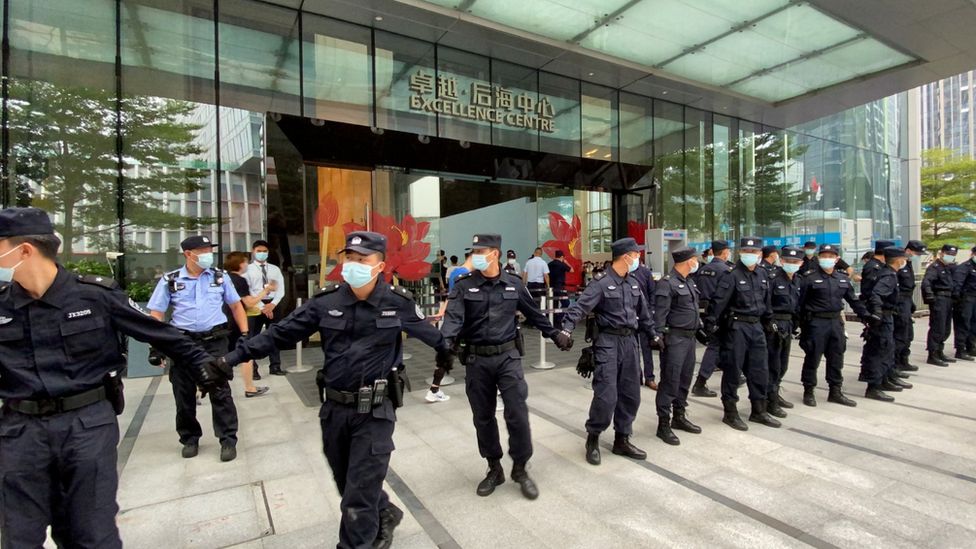
Another user asked: “How will they ever deliver [those] apartments? Many of these units have been paid for by the savings and hard-earned money of several generations across families?”
People were also sharing their experiences as disillusioned and anxious home buyers. In one video on Douyin, China’s version of TikTok, a man said he had to work three jobs to afford both his mortgage and his current rent – because he can’t move into his unfinished Evergrande flat.
When Evergrande’s failings first emerged two years ago, there were protests outside the firm’s offices in Shenzhen in southern China. Those demonstrations have started up again in recent months. At one recent protest, buyers chanted: “Construction stops, mortgage stops. Deliver homes and get repaid!”
Mrs Guo says she and other Evergrande buyers aren’t sitting idly by either. They have formed three groups on WeChat, with nearly 500 members each.
“We have organised ourselves to go to the government. With so many of us they can’t possibly ignore it,” she said.
She also told the BBC that she had been warned by local officials not to speak to the media, and fed promises that construction work at the Evergrande property where she bought a flat would resume soon.
But a few members of her group check on the construction site every day. They’ve seen only a few workers and minimal progress.
“Some of us have stopped paying the mortgage,” Mrs Guo says. “If the bank pushes too hard, they will sleep in the lobby of the bank.”
With additional reporting by Ian Tang and Kelly Ng in Singapore
Yan Chen is a reporter with BBC Chinese

You might also be interested in:
This video can not be played
To play this video you need to enable JavaScript in your browser.
-
-
15 hours ago

-
-
-
10 August 2022
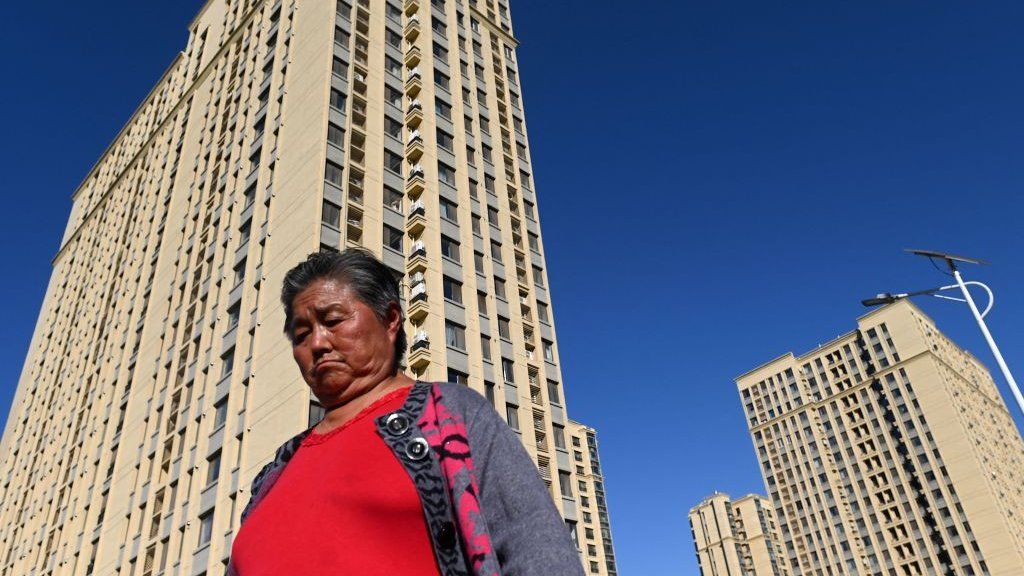
-
-
-
18 September
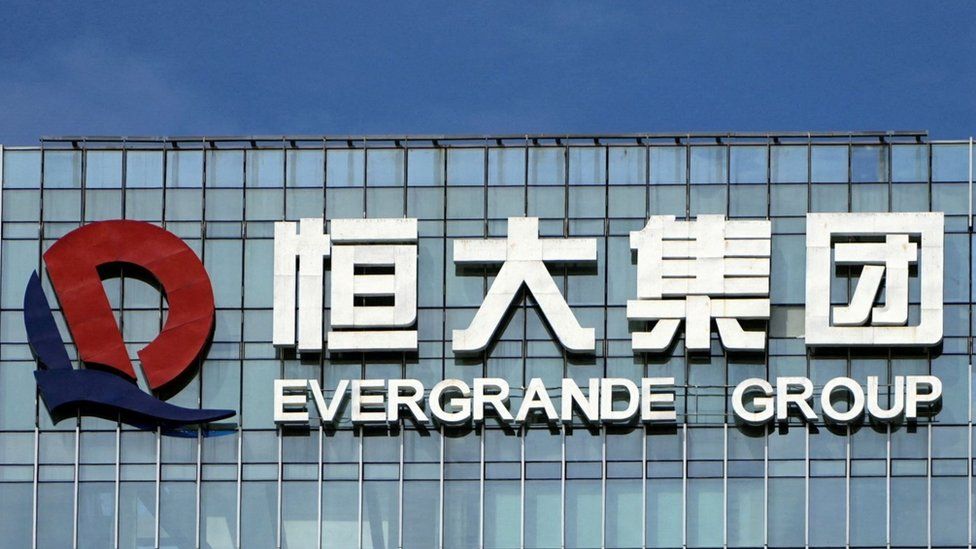
-
Don Quixote in the White HouseÂ
Now that the writers’ strike in the US is over, I can pitch my script for that blockbuster version of Cervantes’ classic crying out to be made: Don Quixote in the White House, updating windmills to stray weather balloons, complete with paranoia and mustache-twirling villains.
(Oh. Democrats don’t do facial hair?) I’ll be putting the donkey into Don Quixote. Maybe work in a nice tune. Hey, Madonna can sing the theme song, give Ted Nugent a break.
We got a red-hot A story – the trials and tribulations of Don Quixote, our hero in his sunset years running the world, getting into scrapes, his mentis not quite as compos as it should be.
He’s an elderly, forgetful, stumbling protagonist, just like the original Don. No, not that one (he’s busy right now – more trial than tribulation), I mean DQ, the lovable old guy from the story.
Character flaws? Plenty. Regrets? He has a few. But then again, too few for the press to mention. A man of mystery, there’s a touch of of something untoward in the background keeping us hooked. Did he? Didn’t he? Loves his family. A fool for his reprobate son who, in a hilarious reversal of everything else in his eyes, he sees with a glowy halo and angel wings. Did I mention character flaws?
The B-story is a light romance set in the world’s seat of power. He loves Xi but the sweethearts fall out over a misunderstanding that Xi wants to ditch him and run off with Europe. We open with DQ defending his squeeze: “China is going to eat our lunch? C’mon, man.” Just to show he was lucid once so mebbe, the movie promises, we can get him there again.
What’s at stake? Only the survival of the entire world.
After he falls for this comical misapprehension, the rest of the movie is spent struggling to restore equilibrium against a spiral of decline. The A and B stories intersect and turn each other in a rising crescendo of mistake after mishap after disaster until they come together at the end, the problem resolved in an explosive payoff – Ka-boom!– and we all live happily in the hereafter.
Ker-ching!
At the start, a choir is telling him, “Now play nice.” OK, they’re minor characters: we kill them off in a car crash in Act One. The other, the devil in his ear, is dragging him to hell in a handcart – we’ll give that one a British accent.
Heh! He commits a series of boo-boos so comically absurd, they’ll have the audience in stitches. Literally. Crimea river and pass the cookies.
With all this screaming hysteria going on, this is where the weather balloon comes in. We know it’s innocent. Xi knows it’s innocent. Senior American General Milley knows it’s innocent and says so, loudly and several times. But still DQ shoots it down. “No, don’t, baby, you’ll only look silly,” Xi pleads with him but, Grrr, he sets his Raptors on to it and shoots that bad boy down.
As if that’s not enough, there are two massive snakes he has to fight in an exciting sequence of subterfuge, sabotage and derring-do. Actually, they’re only oil pipelines, not the mythical serpents of his imagination. Being the gentleman that he is, though, he won’t take credit for decapitating them but pushes Sancho Panza up front to take a bow.
Is it a misunderstanding? Senility? An over-eagerness to grab his former love’s attention? Who knows? Soon, every bozo is jumping on the spy-balloon bandwagon, radiating in intensifying circles of comic horror tragedy.
Across the world, every two-bit, dime-a-dozen demagogue, any politician or public figure in need of a reputation cleanser or booster realizes they can play the China “Get out of jail free” card, ready made for every grade ‘n’ shade of no-goodniks.
In Great Britain, there’s fun-and-frolics in deflecting their flaming nosedive on to China. “Human rights” is the watchword for the biggest Empire ever (except for the US). Reds in the bed, spies in Parliament, no charges in court.
They ban Chinese teachers, replacing them with Taiwanese teachers who don’t have Mandarin as first language, because “spying.” In a call-back to Freedom Fries, they’re only allowed to teach Democracy Mandarin. Ho fun noodles are now no-fun noodles because everything Chinese is a spy. And Britain should know. As the longest-lived, oldest spy network in history, they wrote the book.
Not just Johnny English. All DQ’s little friends get in on the act. Nazis in Parliament? The Russians made us do it. Running away with tech? The Chinese stole our IP. A $33 trillion debt? It’s China that’s collapsing.
So, after promising his lost love, “No, honey, I don’t want to contain you. Let your spirit run wild, fly free,” we realize what he really wants is to put a leash and a muzzle on her and take her for walks.
The DQ gets a catch-phrase: “Not on my watch.” Or “Oh, no, better not let peace break out.” Or how about, “Xi’s a dictator.” Or is that too bitter?
We’ve established him as likable, and earned him sympathy by making him good at his job. OK, he fails at that, but he tries – a goldmine of comic relief. As his inner motivation changes places with his outer skin, transforming him into the villain, we recognize the human dilemma: that we are all a seething mess of contradictions and confusion. Especially him! Big Reveal: he was his own antagonist all along!
So: we need an actor who can capture the full range of his complexity.
I was thinking Chuck.
No, “cold, dead fingers” Chuck. Heston. Ben Hur. Remind me of the doll when we cast the sequel.
Waddya mean Chuck’s dead? He’s playing the president – how will they tell?
If we strapped Chuck as Dead El Cid to the back of a charging steed and slapped it into the battlefront, we can do that with Chuck as DQ. CGI is your friend.
Too far-fetched? Nah! Art imitates Life imitates centuries of Art and eons of BS.
What the audience comes to realize at the end is, this is the movies. It’s all projection.
This script is perfect – who can we get to rewrite it?
Pakistan: At least 20 killed, dozens injured in Mastung blast
 ISMAIL SASOLI
ISMAIL SASOLIAt least 20 people have been killed and more than 50 injured in an explosion in Pakistan, police tell the BBC.
The blast happened near a mosque in the southwestern province of Balochistan on Friday as people gathered to celebrate the birth of Prophet Muhammad.
The police suspect it was a suicide attack targeted at the religious gathering in Mastung city.
Officials have declared a state of emergency.
The casualties are being transported to two hospitals, police said.
Two Mastung city police officials confirmed the death count to BBC News.
Interior Minister Sarfraz Bugti called the blast a “very heinous act”.
Many videos on social media show the injured being rescued by emergency responders and locals.
No group has claimed responsibility for the attack.

-
-
11 January 2013

-
China-Philippines sleepwalking toward a sea fight
MANILA – “What we will do is to continue defending the Philippines, the maritime territory of the Philippines, the rights of our fishermen to catch fish in areas where they are doing it for hundreds of years already,” Philippine President Marcos Jr told reporters amid rising tensions in the South China Sea.
This week, China openly warned authorities in Manila “not to provoke or stir up trouble” following the Philippine Coast Guard’s decision to cut a 300-meter floating barrier installed by Chinese forces around the disputed Scarborough Shoal in the South China Sea.
Rich in fisheries resources and vital to the livelihood of coastal communities in nearby Philippine provinces, the shoal has been under Beijing’s de facto control following a months-long naval showdown with Manila in 2012.
Located just over 200 kilometers off its coast, Manila claims the shoal as part of its exclusive economic zone (EEZ) in the South China Sea. In contrast, China’s nearest province of Hainan is nearly 900 kilometers away.
A 2016 arbitral tribunal ruling under the aegis of the United Nations Convention on the Law of the Sea (UNCLOS) found the resource-rich lagoon within the shoal as a
common fishing ground” for multiple littoral states in the area. Accordingly, it censured China for blocking other countries, especially the Philippines, from exercising its sovereign rights in the area.
“[I]n terms of taking down the barrier, I don’t see what else we could do,” the Filipino president lamented, seemingly perplexed over China’s recent actions and public threats. “I don’t understand why this happened,” Marcos Jr added.
Peeved by Manila’s defiance, China’s foreign ministry has underscored its commitment to “uphold the sovereignty and maritime rights and interests of the Huangyan island [Scarborough Shoal.]”

Shortly after, China flexed its muscles by issuing a warning over planned military exercises in some parts of the South China Sea without providing specific details.
China, which earlier hoped for a “new golden era” of bilateral relations under Marcos Jr., is also seemingly perplexed by the sharp deterioration in ties in recent months.
As a result, there are growing worries over the possibility that the two neighbors will sleepwalk into conflict, with Manila’s allies in the West also preparing for contingencies in the South China Sea.
Not long ago, Manila and Beijing enjoyed an unprecedented era of warm relations. During former president Rodrigo Duterte’s term, top Chinese diplomats described the Filipino leader as Beijing’s “most respected friend.”
Shortly after his emphatic election victory, largely thanks to the support of the Dutertes, Marcos Jr vowed to “shift [bilateral ties] to a higher gear.” Accordingly, the Filipino president chose – similar to his pro-China predecessor – Beijing, rather than Tokyo or Washington, as his first major foreign destination.
Instead of solidifying years-long rapprochement between the two nations, however, Marcos Jr’s relatively short visit only revealed the yawning gap between the two sides on territorial issues.
By all accounts, the Filipino president returned home empty-handed, with Beijing offering no concrete concessions either in the South China Sea or on largely unfulfilled infrastructure investment pledges made to Duterte.
But the sticking point, according to former Philippine associate justice Antonio Carpio, was Beijing’s refusal to budge on the Reed Bank, an energy-rich area off the coast of the Philippine western island of Palawan.
According to the influential Filipino magistrate, the Duterte administration initially explored the possibility of jointly developing energy resources in the area under a “service contract”, which would affirm Philippine sovereignty over the disputed area.
Carpio, who has been in touch with senior Philippine officials, told this writer that Beijing’s mixed signals on the modality of the joint energy development deal eventually scuttled the negotiations under the Duterte administration.

Contrary to his expectations, however, Marcos Jr failed to secure any concession on the issue during his own trip to Beijing earlier this year.
With the Philippines’ main source of natural gas in Malampaya running out in coming years, the Marcos Jr administration is desperate to develop energy resources in the Reed Bank. As a result, Carpio told the author, the Filipino president “decided to call on traditional allies” to enhance the Philippines’ position in the sea.
Over the succeeding months, Marcos Jr greenlighted expanded defense ties not only with the US under the Enhanced Defense Cooperation Agreement (EDCA), but is also pursuing a Visiting Forces Agreement with Japan and has signed a new strategic partnership pact with Australia.
The Filipino president is also exploring defense acquisitions from partners in South Korea, India and Europe.
Emboldened by growing support from traditional allies and Marcos Jr’s more assertive stance, Philippine Coast Guard (PCG) and Philippine Navy (PN) officials have upped the ante.
Accordingly, Philippine maritime forces have doubled down on asserting the Southeast Asian nation’s position in the area, most especially over the contested Second Thomas Shoal.
Crucially, the PCG has also proactively exposed and publicized violent encounters with Chinese counterparts in the contested waters, while the PN has exposed environmental degradation by suspected Chinese militia forces.
This set the stage for the latest round of tensions. Having failed to deter Philippine forces from resupplying their marine detachment on the Second Thomas Shoal, China proceeded to tighten the noose around Scarborough Shoal by installing a 300-meter floating barrier in the fisheries-rich area.
The PCG responded immediately, releasing video footage that showed its personnel, posing as fishermen, cutting down the Chinese-installed barriers.
Philippine National Security Adviser Eduardo Ano, a former Philippine military chief, backed the move as “well within its rights” since China has no right to unilaterally block Filipino fishermen from accessing the area. The heavily publicized move outraged Beijing, which warned the Philippines against “stir[ring] up trouble.”
Chinese foreign ministry spokesman Wang Wenbin shot back, warning: “We advise the Philippines not to provoke or stir up trouble” and reiterated that Beijing “firmly upholds the sovereignty and maritime rights and interests of [Scarborough Shoal].”
The US has made clear that any attack on Philippine troops, aircraft or vessels in the South China Sea will automatically invoke the two allies’ Mutual Defense Treaty. For their part, Australia, Japan and a host of European powers have vowed to support Philippine efforts to defend its sovereign rights within its Exclusive Economic Zone.
The Southeast Asian nation is expected to conduct more regular joint patrols with key allies in the area, while the US Pentagon has regularly provided over-the-horizon support by deploying drones and frigates in Philippine waters.
They have also blamed China for raising tensions through massive reclamation projects, which have created large-scale military facilities across disputed features while unilaterally claiming up to 90% of the South China Sea basin in contravention of international law.
“Over the past decade, [China] has added more than 3,200 acres of land to its seven occupied outposts in the Spratly Islands, which now feature airfields, berthing areas, and resupply facilities to support persistent PRC military and paramilitary presence in the region,” US Deputy Assistant Secretary of Defense Lindsey Ford told a US House subcommittee earlier this week while squarely painting China as the main source of instability in the region.

“Since early 2018, we have seen the PRC steadily equip its Spratly Island outposts — including Mischief Reef, Subi Reef, and Fiery Cross — with an increasing array of military capabilities, including advanced anti-ship cruise missiles, long-range surface-to-air missile systems, J-20 stealth fighter jets, laser and jamming equipment, and military radar and signals intelligence capabilities,” the US official said.
Philippine authorities, however, have made it clear that they will be at the forefront of defending the country’s sovereign rights in the area. In its National Security Policy for 2023 to 2028, the Marcos Jr administration said that external threats, mainly from China, will be a top national security priority.
“The current strategy now is working, but it’s just an improvement… it’s a whole of government approach to issues,” said Vice Admiral Alberto Carlos, commander of the Armed Forces of the Philippines (AFP) Western Command (WesCom) overseeing the South China Sea.
Philippine top commanders have vowed to confront China’s “grey zone tactics” and “dangerous maneuvers”, with key allies providing operational and over-the-horizon support.
All of a sudden, China is confronting a much more assertive and confident Philippines, which no longer shuns openly defying its giant rival in the contested waters. It’s unlikely, however, the Asian superpower will sit by idly, thus raising the specter of a head-on showdown in the South China Sea in the near future.
Follow Richard Javad Heydarian on X, formerly known as Twitter, at @Richeydarian
Indonesia plans Bali light rail to ease congestion from airport
JAKARTA: Indonesia plans to start building a light rail transit system on the popular resort island of Bali next year to ease roadway congestion from the airport, a senior minister has said. Tourist-dependent Bali attracts millions of foreign visitors annually and the beach-dotted island’s narrow roads have been clogged with trafficContinue Reading
Singaporean woman and daughter arrested in Manila airport for allegedly smuggling 14kg of cocaine worth US$1.3m
SINGAPORE: A Singaporean woman and her daughter were arrested at Manila’s main international airport on Thursday (Sep 28) for allegedly smuggling 14.36kg of cocaine worth 76 million pesos (US$1.3 million) into the country. The Manila Times reported that the illegal drugs were seized by the Bureau of Customs. The pairContinue Reading
Vachathi: India court upholds convictions in 30-year-old rapes
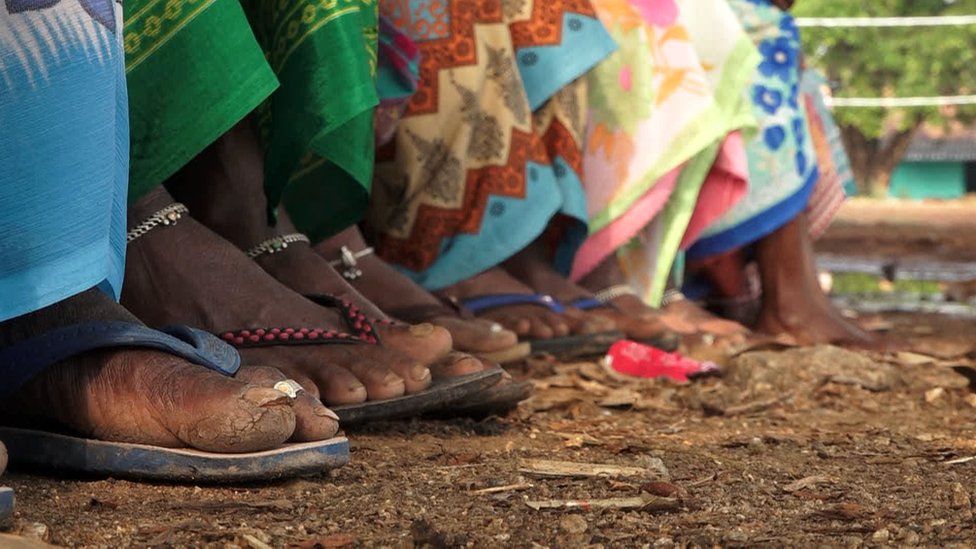
The high court in India’s Tamil Nadu state has upheld the convictions of hundreds of government officials for atrocities against tribals, including rapes of 18 women, three decades ago.
The convicts include policemen and officials from the forest and revenue departments.
They had attacked the tribals in June 1992, accusing them of aiding the dreaded sandalwood smuggler Veerappan.
They assaulted the men and raped women, vandalised homes and killed livestock.
The crime has come to be known as the Vachathi case after the name of the village where it took place.
All the 269 accused denied the allegations against them, but in 2011, a trial court convicted them, pronouncing them guilty under the Scheduled Castes and Scheduled Tribes Act. Seventeen of the men were also found guilty of rape.
As 54 of the accused died during the trial, the remaining 215 men were sentenced to prison terms between one and 10 years. The convicts appealed in Madras High Court in the southern city of Chennai.
A lawyer for the survivors told the BBC that the convicts have all been out on bail. “Barring the 17 men who were convicted of rape, most others did not spend any time in prison,” she said.
On Friday, Justice P Velmurugan ordered the state to give compensation of 1m rupees ($12,034; £9,844) to each victim and suitable employment, legal website LiveLaw reported.
The judgement also called for stringent action against the then senior-most district official, forest official and superintendent of police, it added.
In March, Justice Velmurugan had visited Vachathi, located in the foothills of picturesque Sitheri hills in Dharmapuri district.
What happened in Vachathi?
In the 1990s, forests and villages in the area had seen intense search operations by law enforcement officials looking to catch Veerappan, India’s most ruthless bandit who was accused of more than 100 murders, kidnapping, smuggling and poaching. (He was finally killed by police in 2004.)
Vachathi was often visited by the authorities who accused the villagers of aiding the smuggler and being involved in sandalwood smuggling.
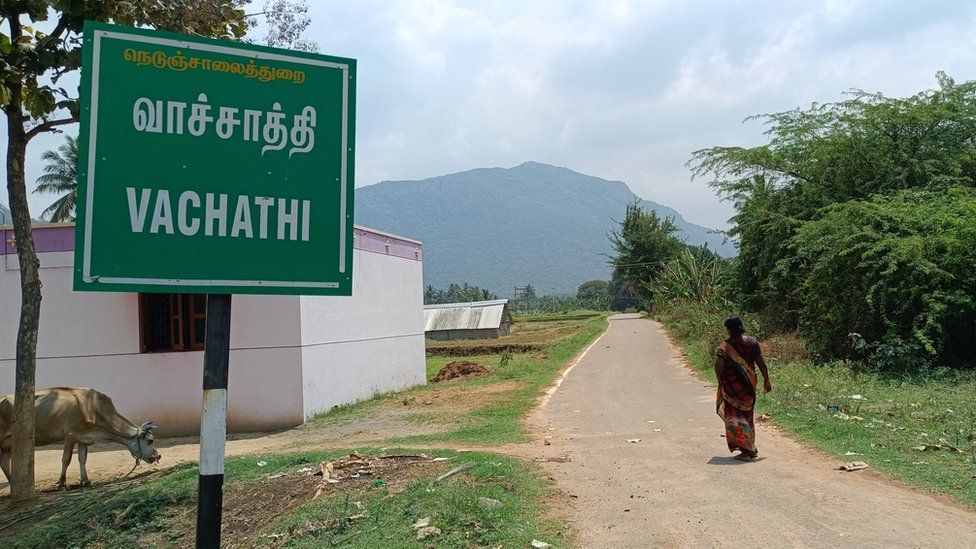
On the morning of 20 June 1992, villagers and forest department officials had clashed during one such visit and one forester was injured.
According to court documents, a few hours later, a team of 155 forest personnel, 108 policemen and six revenue officials raided the village.
They found mostly women and children and a few old men in the village as most men had escaped to the nearby hills where they remained in hiding for months.
The raiders went on a rampage, mercilessly beating up men and women, ransacking homes, destroying livestock and repeatedly raping 18 women.
More than 100 women and children were taken into custody and jailed for months under fake charges – 20 years later, the high court threw out the cases saying they were “maliciously instituted with an ulterior motive”.
The Hindu newspaper called the attack an example of “what brutal law enforcers and callous government officials could do to the poor and the powerless”.
The horrific rapes
A huge banyan tree in the centre of the village stands as a witness to the assault.
The villagers recently told BBC Tamil that men, women and children were made to assemble there and were beaten up severely.
A group of 18 young women and girls was separated from the group and taken to a nearby lake where they were repeatedly raped.
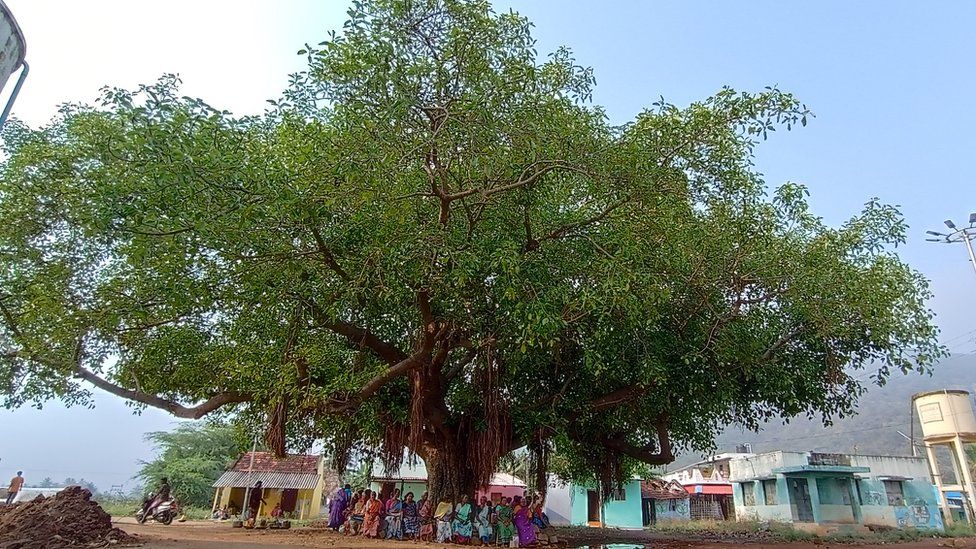
One rape survivor, who was just 13 then, said she begged the officials to spare her since she was just a schoolgirl, but they ignored her pleas.
“They raped us, we were beaten up, all over the village, we could hear people crying and wailing,” she said.
“After they raped us near the lake, they took us to the police station and we were not allowed to sleep the whole night. I was taken to jail along with my sister, uncle, aunt and mother,” she added.
When they returned from jail weeks later, they found their grains and vessels thrown out, clothes burnt and carcasses of their cattle floating in the village well.
The long road to justice
The tribals’ fight for justice has been long and arduous, with roadblocks delaying it at each step.
Officials initially denied any wrongdoing. The police refused to lodge any complaints and courts turned them away saying police and government officials couldn’t have raped them.
It was handed over to India’s Central Bureau of Investigation (CBI) following campaigns by civil society activists and members of the Communist Party of India (Marxists).
In its report, the CBI confirmed that the policemen and officials ran amok, thrashing men, women and children, and demolishing huts.
It is only with the support of activists and the persistence of rape survivors that justice was been finally serviced in the Vachathi case.
BBC News India is now on YouTube. Click here to subscribe and watch our documentaries, explainers and features.

Read more India stories from the BBC:

Related Topics
Anthony Chen’s The Breaking Ice selected as Singaporeâs 2024 Oscar entry for Best International Feature Film

Local filmmaker Anthony Chen’s movie The Breaking Ice has been selected by the Singapore Film Commission as the country’s entry to the 96th Academy Awards in 2024, in the Best International Feature Film category.
This was announced on Friday (Sep 29) by the Infocomm Media Development Agency.
“It is an honour once again to be selected as Singapore’s Oscar submission and also even more meaningful in a year when I have been invited into The Academy,” said the Singaporean director, who also wrote the script and co-produced together with Meng Xie under their Canopy Pictures banner.
“This film wouldn’t have been possible without the creative talents and passion of our very international team. I look forward to sharing this film with audiences in the States and around the world.”
The film opened in Singapore on Sep 7.
Ukraine war: Who has the real mobilization problem?
When Vladimir Putin called for a partial mobilization in September 2022 it was a sign to ordinary Russians that – despite all the Kremlin’s denials – this was no longer a “special military operation” but a real war.
In response to Ukraine’s successful counteroffensive which recaptured swaths of territory from Russia, Putin called up around 300,000 men – around 1% of the eligible pool of reservists.
Mobilization, which has occurred only once in Russia before last year (in 1941), is different from the country’s regular conscription mechanism, which calls up about a quarter of a million men aged 18 to 30 each year (the age limit was raised from 27 to 30 in April).
Conscripts are not allowed to fight outside Russia, but once they have completed their one-year national service, they join the reserves and can be called on to fight.
But, despite the huge reserves that the Kremlin can call on, it’s clear that, especially in the run-up to the next presidential elections in May 2024, another round of call-ups would be very unpopular.
Yet there have been persistent rumors that a new mobilization is imminent. This is partly a misinformation campaign launched by Kiev to sow dissent in Russia. In December 2022, the then-defense minister Oleksii Reznikov and military intelligence chief Kyrylo Budanov claimed that a new wave of mobilization would begin on January 5, 2023.
When this didn’t happen, Ukrainian officials continued to claim that half a million men would be mobilized in January. It warned eligible draftees to flee Russia.
Again in September 2023, Ukrainian sources claimed a new mobilization was planned for the day after the Russian regional elections on September 10. Once more, nothing happened.
Spreading rumors of imminent mobilization in Russia is clearly part of Ukraine’s psychological warfare, but the more they do it without anything happening, the less credible it becomes.
And, in fact, it’s Ukraine that is under pressure to conscript enough troops as its counteroffensive struggles for momentum.
Changing moods
Unlike in September 2022, Kiev’s much-anticipated spring and summer offensives have not had the impact that many in the West had hoped for. In fact, the opposite is true and realists are now talking down the prospect of a Ukrainian breakthrough any time soon.
It’s a big contrast to when I visited Russia in May, when the mood was gloomy, with expectations of a new Ukrainian offensive against the backdrop of Yevgeny Prigozhin’s increasingly hysterical videos claiming that the Russian army was a complete shambles.
But this gloomy mood quickly dissipated when footage of burning Ukrainian Leopard tanks and Bradley infantry fighting vehicles appeared in early June.

By the time I returned in August, the perception of the threat from Ukraine had completely changed. By September, even some pro-Ukrainian bloggers had to admit that the much-hyped offensive was having little strategic impact.
Putin claims to have recruited another 300,000 volunteers in 2023. While some may be those who’ve already signed up, more are joining – as confirmed by Ukrainian intelligence. So with a stable front and steady recruitment, there would seem to be little need for the Kremlin to proceed with what would be a deeply unpopular mobilization.
Russian pro-war bloggers complain that the country has refused to go into “total war” mode. But if it’s a long war of attrition, as seems likely, maintaining normality is actually a strength.
Russia is ramping up its war production and its army is also gaining the practical experience of war that it clearly lacked in the early stages. It could enter 2024 in better shape in terms of weapons, ammunition and troop experience.
So why would it resort to an unpopular mobilization when it can withstand anything Ukraine and its NATO allies can throw at it?
Strain on Ukraine
Pundits, retired generals and Ukrainian and Western officials had high expectations of a decisive Ukrainian breakthrough towards the Sea of Azov.

This summer arguably saw a strategic defeat for Ukraine and NATO in their attempt to end the war by military means. NATO countries supplied and trained Ukraine as best they could. And, thus far at least, it has yielded next to nothing.
To get another chance, Ukraine will have to mobilize even more troops and get more advanced weapons in greater quantities than ever before. Yet, for all the talk of Russia’s mobilization, it is Ukraine that seems to be suffering from manpower shortages.
Kiev is resorting to increasingly draconian measures to get sufficient numbers to the front. It recently extended mobilization to previously exempt groups such as the partially disabled.
The recent anti-corruption crackdown on military recruiters suggests that after 18 months of war the usual means of mobilization are no longer enough. It also indicates a lot of people are desperate to avoid mobilization and willing to paying large bribes to do so. No wonder Ukrainian men of fighting age are not allowed to leave the country.
Equally worrying for the government of Volodymyr Zelensky are the potential political consequences of undermining support for the war effort if large numbers of people who don’t want to fight are forced into uniform. This will also affect Ukraine’s morale on the battlefield.
With Russia setting its own spending to an unprecedented level, arming Kiev for another decisive advantage will cost much more than the US$113 billion already spent by the US alone.
At present, the Biden administration is seeking approval for another $20 billion, which is already a tough sell in the Republican-controlled Congress. Meanwhile, Kiev’s European allies couldn’t arm Ukraine on their own, even if they wanted to.
The bottom line is that Ukraine, which is completely dependent on outside support both financially and militarily, will find it hard to sustain its war effort at current levels. Right now it is Kiev, not Moscow, which is under greater pressure.
Alexander Titov is Lecturer in Modern European History, Queen’s University Belfast
Disclosure: Alexander Titov does not work for, consult, own shares in or receive funding from any company or organization that would benefit from this article, and has disclosed no relevant affiliations beyond their academic appointment.
This article is republished from The Conversation under a Creative Commons license. Read the original article.
Woman jailed for selling counterfeit branded goods from Taobao at makeshift stalls
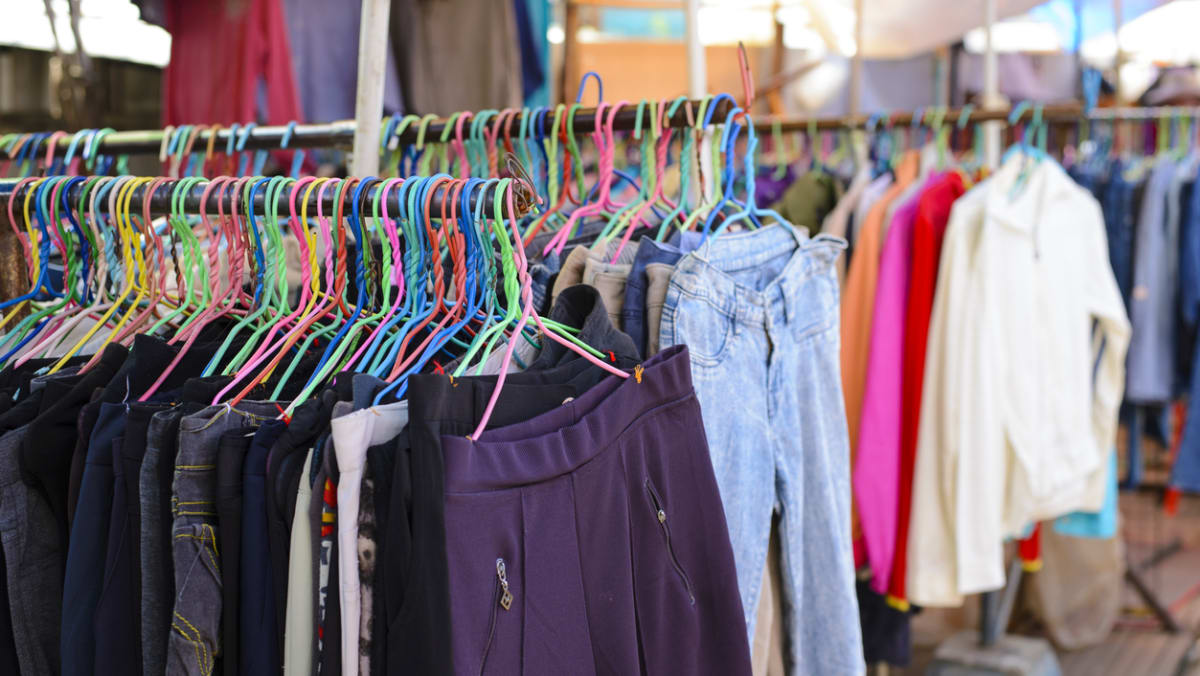
SINGAPORE: A woman who sold counterfeit branded goods she bought from Taobao and other e-commerce platforms at makeshift stalls was sentenced to six weeks’ jail on Friday (Sep 29).
Vietnamese national Huynh Kiet Binh, 41, pleaded guilty to two counts of having counterfeit goods for sale under the Trade Marks Act, with another five charges considered.
The court heard that Binh lived with her Singaporean husband and began selling clothes at makeshift stalls in May 2022.
She handled every aspect of her business herself, looking for counterfeit branded goods from e-commerce platforms like Taobao and QQ.
She would buy the goods from suppliers based in China and Vietnam, and import them into Singapore to sell.
Binh did not have a fixed location for her stall, moving around depending on the sales spaces that were available.
She would rent a space for a fee between S$80 (US$59) and S$120, and open her stall four days a week on average.
She would rent a movable storage cage to store her stocks for about S$600 a week. She earned revenue of S$1,600 per week, with a net profit of about S$600 a week.
On the morning of May 19 this year, a party of officers from the Intellectual Property Rights branch of the Criminal Investigation Department mounted a police operation at Block 154, Bukit Batok Street 11.
Binh was operating a makeshift stall outside a unit there.
The officers found her running her stall with clothes bearing the trademarks of Adidas, Nike, Puma, Under Armour, Guess, Levi’s, Champion, Chanel and Tommy Hilfiger, as well as non-branded clothes for sale.
The officers arrested Binh after discovering that the branded clothes were counterfeit and searched her stall.
More than 800 pieces of counterfeit branded clothes were seized.
Representatives from various brand owners confirmed that the goods were manufactured without their consent, in an infringement of their registered trademarks.
The prosecution sought eight to 10 weeks’ jail, saying Binh had persisted in selling such clothes for a year until she was apprehended.
The use of makeshift stalls rather than a permanent shop “does not diminish the permanence and enduring nature of her enterprise”, said the prosecutors.
However, they said her operation was “modest”, generating just S$2,400 in monthly profit.
For each charge of possessing counterfeit branded goods for sale, Binh could have been jailed for up to five years, fined up to S$100,000 depending on the number of infringing items, or both.

